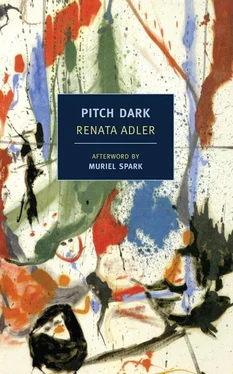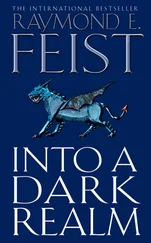Renata Adler - Pitch Dark
Здесь есть возможность читать онлайн «Renata Adler - Pitch Dark» весь текст электронной книги совершенно бесплатно (целиком полную версию без сокращений). В некоторых случаях можно слушать аудио, скачать через торрент в формате fb2 и присутствует краткое содержание. Год выпуска: 2013, Издательство: NYRB Classics, Жанр: Современная проза, на английском языке. Описание произведения, (предисловие) а так же отзывы посетителей доступны на портале библиотеки ЛибКат.
- Название:Pitch Dark
- Автор:
- Издательство:NYRB Classics
- Жанр:
- Год:2013
- ISBN:нет данных
- Рейтинг книги:3 / 5. Голосов: 1
-
Избранное:Добавить в избранное
- Отзывы:
-
Ваша оценка:
- 60
- 1
- 2
- 3
- 4
- 5
Pitch Dark: краткое содержание, описание и аннотация
Предлагаем к чтению аннотацию, описание, краткое содержание или предисловие (зависит от того, что написал сам автор книги «Pitch Dark»). Если вы не нашли необходимую информацию о книге — напишите в комментариях, мы постараемся отыскать её.
Pitch Dark Composed in the style of Renata Adler’s celebrated novel
and displaying her keen journalist’s eye and mastery of language, both simple and sublime,
is a bold and astonishing work of art.
Pitch Dark — читать онлайн бесплатно полную книгу (весь текст) целиком
Ниже представлен текст книги, разбитый по страницам. Система сохранения места последней прочитанной страницы, позволяет с удобством читать онлайн бесплатно книгу «Pitch Dark», без необходимости каждый раз заново искать на чём Вы остановились. Поставьте закладку, и сможете в любой момент перейти на страницу, на которой закончили чтение.
Интервал:
Закладка:
Look here.
This is about the old couple, weaving back and forth across the road, looking for eagles, who told us about the air controllers’ strike.
Before I resume my torts songs, I’d like to mention what I did not always know: what an act, what a prolonged state, of bitterness, hatred, stamina, rage, grim aggrieved persistence it requires to sue. More often, people mention money. It is true that, here, lawsuits are expensive. In Germany, a woman leaning over her back fence insults a neighbor with an epithet. The neighbor sues for slander. At issue may be twenty marks. The loser pays the winner’s legal costs. The lawyer takes his cut. And that is that. Here, on the other hand, with an ingenuity that should take an entrepreneurial schemer’s breath away, there has evolved the following proposition: that a legal job no sooner comes into existence than it generates, immediately and of necessity, a job for a competitor. I can think of no other line of work where this is true. Even in something as apparently two-sided as, say, tennis, where you would think one competitor’s initiative inevitably entails work for another, there is not the same degree, or relation, of necessity. It is always possible, that is, that a tennis player will serve a ball and no one will return it, or issue a challenge and no one will respond. But, if a lawyer has been employed to sue, you must employ another to defend, or else you lose. And to have such a profession highly paid, and paid for the most part not on commission but by the hour , meaning the longer it takes the more it costs, with no objective measure (as in mining, say, or the construction of a house or of a coronary bypass) of just how much work is done; well, it is a dream.
Freudian analysis had, for a time, its own inspired market thesis: that the cost was part of the treatment; that part of what you were paying for, in other words, was the overprice. And surgeons are thought to be well paid, particularly when the surgery is unsuccessful and the patient dies. But in neither case is what the professional is paid to do the undoing of what is being done, at the same time, in the same forum, by an equally well-paid professional. And even in fields where there exists a symbiosis, or at least an ambivalent dependence, between what are, professionally, antagonists — crooks and detectives, prisoners and prison guards, in one sense social workers and the poor — the dependence is one way. Detectives and prison guards need criminals, social workers require that people should continue to be poor; there are, in short, many workers with a vested interest in the failure of institutions that employ them, and in the insolubility of problems they are paid to solve. The perfect instance occurs in the narcotics laws. A substance, cheap to manufacture, is addictive. It is outlawed. Being outlawed, it becomes rare and expensive. Immediately, and for the first time, it becomes profitable for someone, the seller, to make people addicted to it. The law generates a criminal apparatus which in turn generates a law-enforcement apparatus. With time, their personnel become the same. But the nearest analogue, as a business, to the law lies not in business but in the military, as it prepares for war. If I build a bomb I virtually assure that my adversary must build a bomb; but no one would maintain that anything valuable, conceptual or moral, within our system rests upon this symmetry, as it is said to rest on the adversary system in the law. Last year, the amount spent on lawyers in this country was approximately eighty billion dollars. Much more, of course, was spent upon defense. Whose voice is this? Not mine. Not mine. Not mine.
I said, But can we live this way. He said, I don’t know, but it’s too bleak. I’m here and you are gone. I just can’t let it happen. I said I can’t, either. But do you sometimes wish it was me? Always.
Here’s how it was: the ice in my drink at the radical lawyer’s house was melting. It was night, after my usual bedtime. I was having vodka. He was drinking coffee. His wife and the two others had their herbal teas. And the ice cube in my drink, I could not help noticing, was murky. I mean, apart from a kind of frost around it, there was, unmistakably, a speck of brown. Ice cream, I hoped. A little melted chocolate ice cream, spilled over perhaps from its cardboard container, frozen now into the cube. But as the ice continued melting, and whatever it was come closer to dissolving in my vodka, well, I thought, this is a radical house of late-night coffee and of herbal teas. When I was offered a vodka and accepted, I should have known I took my chance. But then, of course, I thought I’d drink it down before it melted, while the drink was clean and still transparent. But I didn’t. What the hell. And somehow, amiable, pleasant, interesting as the conversation was — about terrorism, about the passport cases — I hoped that there was something about which we might genuinely agree, one subject maybe that mattered or did not matter equally to us both, and on which we could be, how else to put it, friends. So I said, about those witnesses before congressional committees in the fifties, why is it that every book and article calls them informers? It seems such a hard word. I mean, regardless of what they said or didn’t, they were witnesses, under subpoena; informers suggests something quite different, a betrayer for instance in one’s midst for pay, as in Ireland say, in those days. And the lawyer, and more emphatically his wife, said, But you don’t realize how many people’s lives were ruined. And I thought, Still, still, there must be a safe harbor for us in this conversation. In the end, there was, a safe and uneasy harbor; we got there the long way round. But in the meantime I had said, I think truly, I was trying to keep it true, Didn’t we, or most of us, in those days, think of government in another way. I mean, we assumed it was for us, it was trying to do the right thing. When the state came and said, for instance, to my parents, you must take that spillway down and lower the level of what had been a beautiful lake by four feet, you must do it for safety reasons, my parents would never have questioned it. They were appalled to think it had been unsafe, that people were imperiled by it. And they took down the two-hundred-year-old spillway at once and without question. Now, now we know better, that the state was not at all benign in this and not concerned with safety, and that the Constitution even foresaw this, foresaw that the state itself is what citizens must be protected, by law, against; and now we know we should have resisted by every legal means. Now, we may even be able to restore the beauty of the lake. But then, in those days, we trusted. That idea is embodied for me in this, that in those days a lady on the train said to me that if I got lost in the city (it was my first visit by myself), I must ask a policeman. Ask a policeman. A policeman. And of course, in due course, I could never ask a policeman in, say, Neshoba County. And, in due course, something happened, not the absolute deterioration, no, but something happened to that idea of government, and trust.
So we left it. I mean the witness/informer question, as it turned out, meant so much more to them than to me that I left it, and they even came a little bit nearer to me on the question, about which oddly enough I turned out to care more than they, of terrorism; and we had always agreed on the passport cases. But I went home sad anyway, and uneasy. I thought I’d get some milk at the all-night Korean grocery, and then, as I passed my car, parked so legally and felicitously at the curb since that afternoon, I remembered there were some letters in it, which the post office had forgotten to forward to my former tenant. I thought, I hope he’s forwarding my letters, if there were any; and so I stopped, thinking, It’s time I forward his. I had difficulty unlocking my car door, though, so I put the bag of groceries on the sidewalk, and my handbag on the fender, thinking nothing about it. And I opened the door, and leaned into the car to retrieve those letters. With no sense of threat, I felt a presence, two presences looming behind me. I turned, and they ran. To my amazement, I ran after them, shouting, in a voice I didn’t know. Absurdly. Please, stop thief. Running. Nobody so much as turned as we ran, they or I, right past them.
Читать дальшеИнтервал:
Закладка:
Похожие книги на «Pitch Dark»
Представляем Вашему вниманию похожие книги на «Pitch Dark» списком для выбора. Мы отобрали схожую по названию и смыслу литературу в надежде предоставить читателям больше вариантов отыскать новые, интересные, ещё непрочитанные произведения.
Обсуждение, отзывы о книге «Pitch Dark» и просто собственные мнения читателей. Оставьте ваши комментарии, напишите, что Вы думаете о произведении, его смысле или главных героях. Укажите что конкретно понравилось, а что нет, и почему Вы так считаете.












